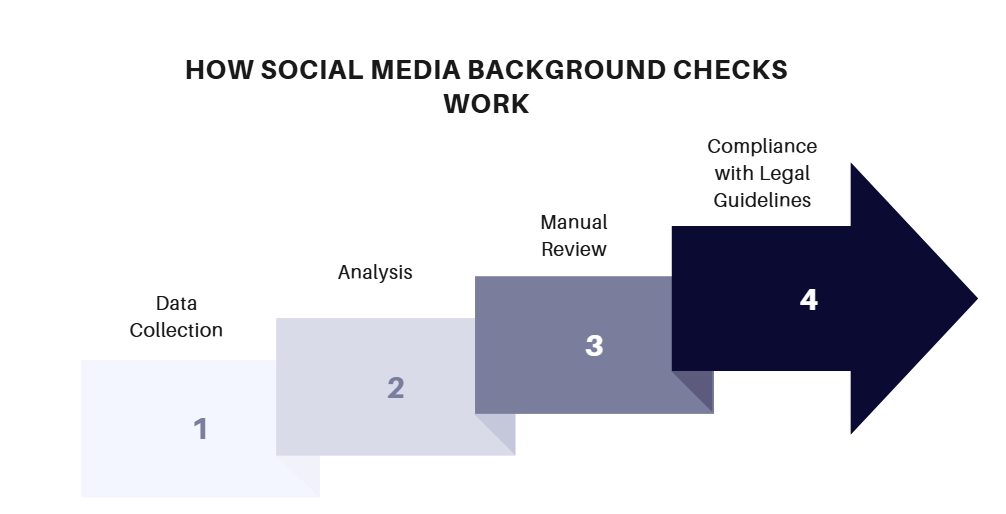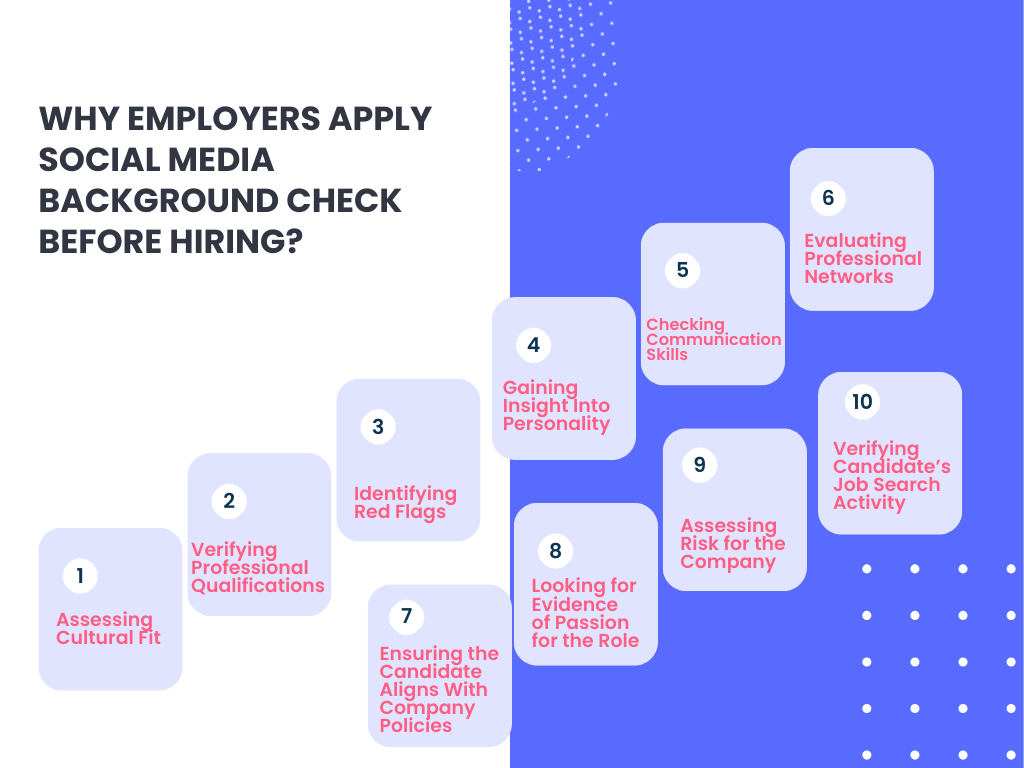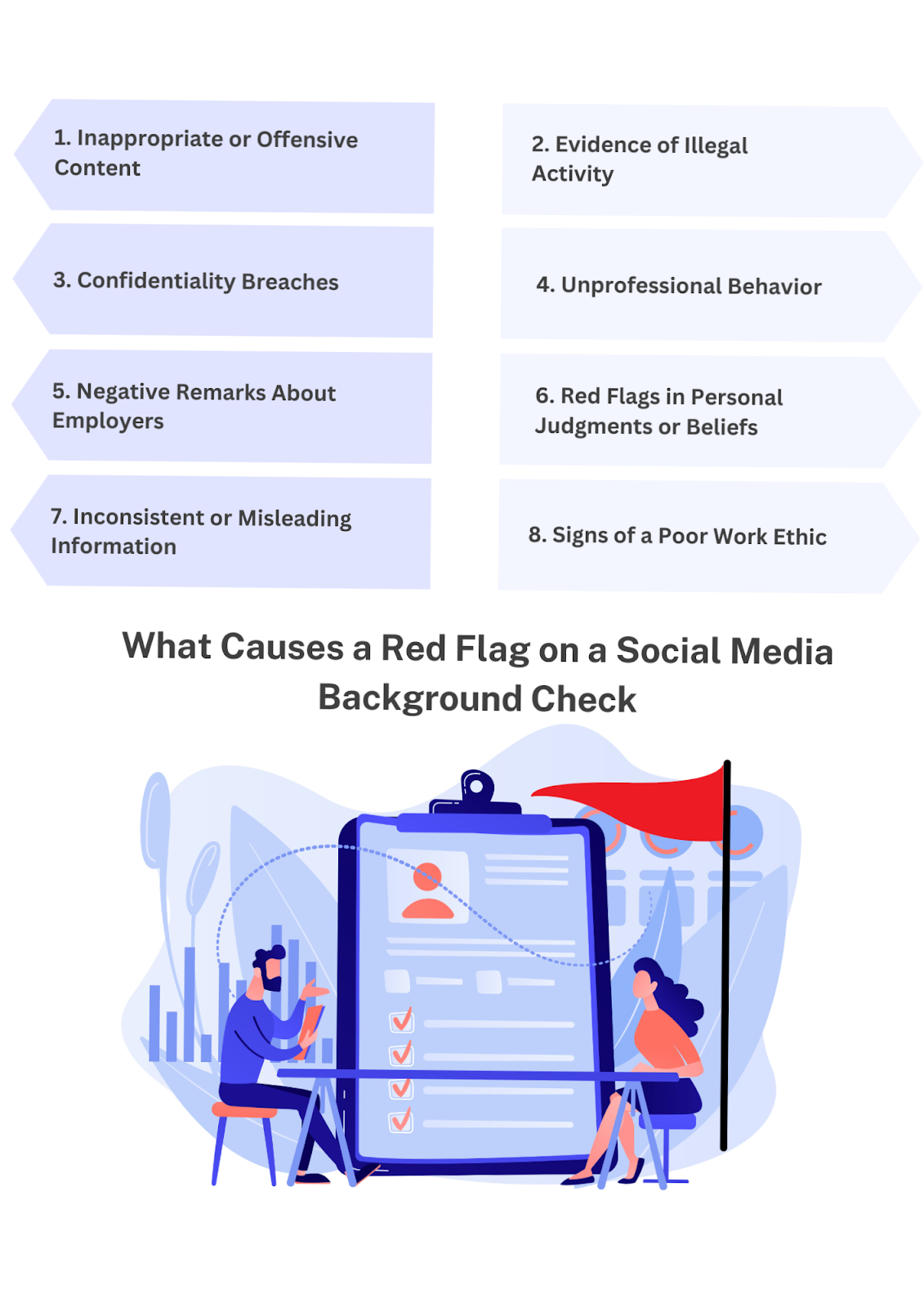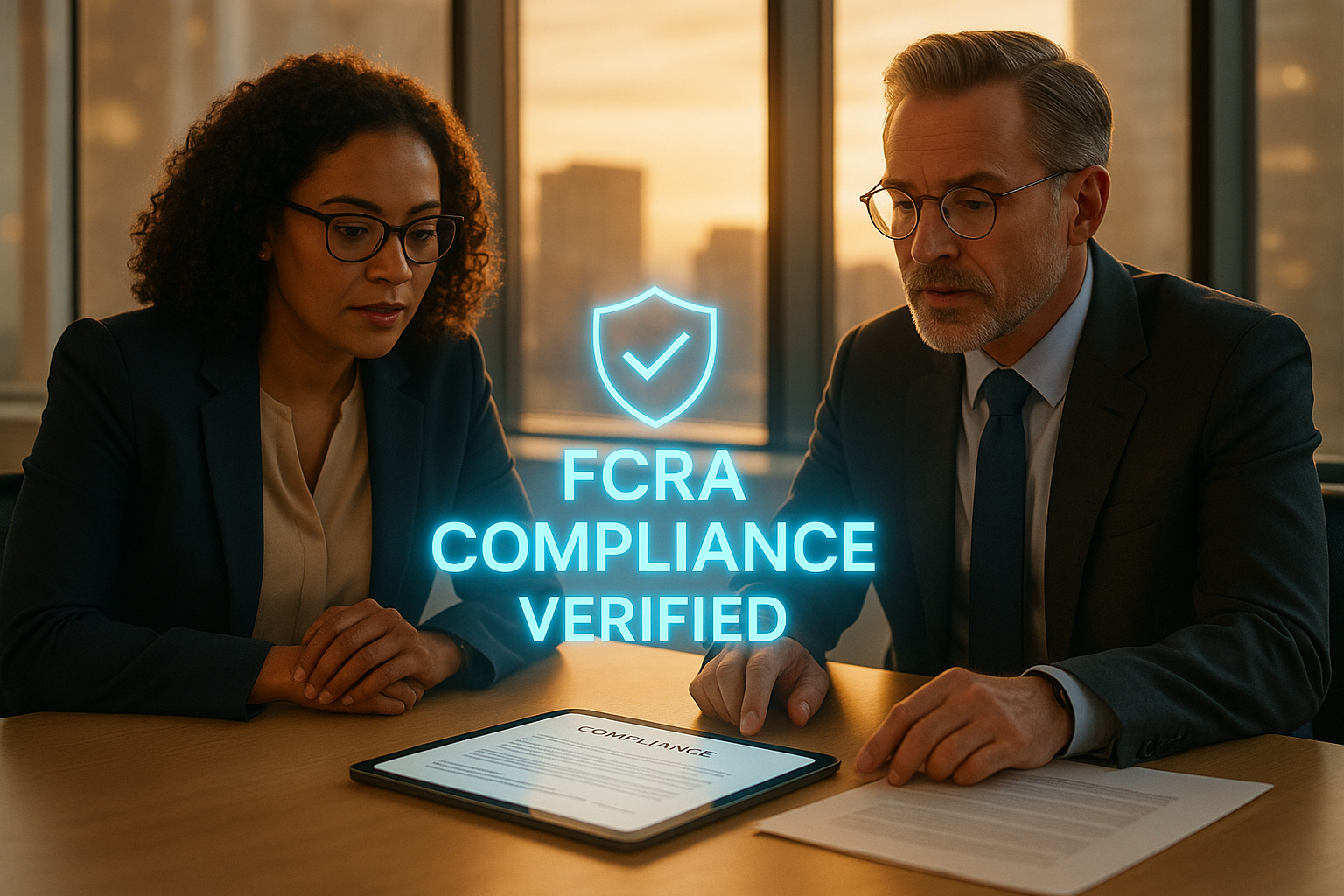Social Media Background Checks: Employers and Employees Full Guide

Evaluating job candidates through their online presence has become an important step in hiring process for modern recruiters offering several reduce hiring bias. A social media screening tool offers insights into an individual's online behavior, which is invaluable for hiring decisions. Employers are increasingly using social media to assess candidates in addition to their resumes, making it an important part of the recruitment process.
By using pre-employment social media screening, organizations can ensure compliance with legal requirements, identify potential risks, and maintain a safer workplace environment. For businesses, the integration of social media screening helps determine a potential employee's risky behaviors. This process goes in addition to traditional background checks, providing a fuller picture of a candidate's online persona and how they might represent the company.
What is Pre-Employment Social Media Screening?

Pre-employment social media screening is a type of background check that assesses a candidate's online activities to evaluate their suitability for a role. This process involves collecting publicly accessible data from social media platforms, offering valuable insights into the applicant's character, values, and potential fit for the organization.
By analyzing social media profiles, employers can better understand a candidate's professional conduct and personal traits, which are critical for making well-rounded hiring decisions.
It complements traditional background checks and identifies red flags such as inappropriate content or disciplinary actions, ensuring that organizations hire responsibly.
Read Article: Other Types of Background Checks to broaden your screening strategies.
Is Social Media Screening Legal?
The legality of social media screening depends on following privacy laws and non-discrimination guidelines. Employers must focus on publicly available information and avoid seeking password-protected content or sensitive data.
It is important to balance ethical hiring practices. Consulting legal experts or partnering with platforms like Ferretly ensures compliance while using technology for effective screenings.
Ferretly follows to all relevant federal and state/provincial regulations regarding pre-employment social media screening and data protection. This includes compliance with the FCRA, EEOC, GDPR, and DPF laws.
What are Social Media Background Checks?
A social media background check is the tool used for social media screening, providing a detailed evaluation of a candidate's online presence to assess their character, values, and potential risks. They provide a wide perspective beyond resumes, allowing organizations to make informed hiring decisions.
This process identifies behaviors such as harassment, inappropriate posts, or discriminatory remarks, reducing liability risks for employers and collect relevant data from social media sites like LinkedIn, Facebook, Instagram, and Twitter, revealing behaviors such as harassment, discriminatory remarks, or unprofessional conduct that could pose risks to the organization. By flagging such red flags, employers can reduce potential legal and reputational risks.
Hiring managers gain insights into a applicant's work ethic, communication style, and how they act in both personal and professional contexts, helping to make more informed hiring choices while ensuring alignment with the company's values and policies.
How Social Media Background Checks Work

Social media background checks are conducted by scanning publicly available data across social media platforms to assess a candidate's suitability for a role. These checks often involve the use of automated screening tools, like Ferretly's AI-powered system, which help analyze social media profiles on platforms such as LinkedIn, Facebook, Twitter, and Instagram.
These tools assess posts, comments, interactions, and any other publicly visible content to identify potential red flags or indicators of character and behavior.
The process can be broken down into a few key steps:
- Data Collection: Automated tools scan public profiles for social media content related to the candidate's behavior, interests, and opinions. This includes any posts, comments, images, or shared media that are accessible without needing passwords or private access.
- Analysis: The gathered data is processed to evaluate the candidate's personality, work ethic, communication style, and possible alignment or misalignment with the company's culture. Red flags, such as offensive comments, unprofessional behavior, or any criminal activity, are flagged for further review.
- Manual Review: While automated tools do most of the heavy lifting, human analysis is often necessary to ensure that the context behind a post is fully understood. This helps prevent any misinterpretations based on isolated content.
- Compliance with Legal Guidelines: It is crucial for employers to remain compliant with privacy laws and non-discrimination regulations when conducting social media background checks. Automated tools like Ferretly help ensure that only publicly available information is reviewed, and the process complies with legal standards.
By integrating social media background checks into the hiring process, organizations can reduce the risk of hiring individuals whose online presence does not align with the company's values or ethical standards, ultimately fostering a safer, more positive workplace culture.
Advanced systems like Ferretly streamline this process, offering detailed reports while ensuring compliance with privacy laws. By adopting these checks, organizations can strengthen their hiring processes and safeguard their workplace culture.
Why Employers Apply Social Media Background Check in Hiring Process?

Employers use social media background checks to learn about candidates as a person, including how they act in public and any comments they have made about their professional history.
In 2024, over five billion people were using social media worldwide, a number projected to increase to over six billion in 2028. There is a good chance your potential employee is on these social platforms. Given the rise in social media use, the average amount of time spent on social media worldwide is 143 minutes per day, social media now plays a major role in hiring.
- Assessing Cultural Fit: Employers check whether the job candidate's personal values and attitudes align with the company culture.
- Verifying Professional Qualifications: Cross-referencing information and employment history on social media profiles with the applicant's resume or interview claims.
- Identifying Red Flags: Any signs of discriminatory language, aggression, or other concerning behavior can influence the hiring process.
- Gaining Insight Into Personality: Social media can give a glimpse into how a candidate presents themselves and interacts with others online.
- Checking Communication Skills: Reviewing a candidate's posts for clarity, tone, and professionalism.
- Evaluating Professional Networks: Hiring managers can see who candidates interact with online, which can shed light on their industry connections and network strength.
- Ensuring the Candidate Aligns With Company Policies: Social media checks help verify that the candidate's behavior aligns with the company's social media and behavior policies.
- Looking for Evidence of Passion for the Role: Posts or activities related to the industry or job role may signal the candidate's enthusiasm for the position.
- Assessing Risk for the Company: Employers gauge any potential risk, such as controversial opinions or risky behaviors, which may affect the organization.
- Verifying Candidate's Job Search Activity: Hiring managers can also observe if candidates are actively seeking job opportunities, which can help assess their job search habits.
Fact is that most employers (91%) already conduct social media screening in their hiring process, and 54% have decided not to hire someone based on the information they discovered during the process, which underscores its growing importance in modern recruitment strategies.
By using pre-employment social media screening, employers can make more informed decisions, ensuring they find candidates who align with the company's values and minimize hiring risks.
For further insights on the Importance of social media screening, consider exploring why this tool is essential in the recruitment process. Also, check out the difference between Pre-Hire and Post-Hire Social Media Screening to understand how social media affects job opportunities.
Benefits of Social Media Background Checks

Pre-employment social media screening plays a crucial role in providing employers with a comprehensive view of a candidate's character and behavior online. Below are some of the key benefits of using social media background checksduring recruitment:
- Simplifies the Background Check Process: Social media profiles are publicly accessible and provide valuable insights into a candidate's personality and professional life. This reduces the time and effort spent on traditional checks.
- Provides Insights Into Candidate Opportunities: Through their social media activity, employers can see if the candidate is genuinely engaged in the industry or role they are applying for, indicating enthusiasm and passion.
- Identifies Potential Red Flags: Social media profiles often reveal behaviors or comments that could be a red flag for potential employers, such as offensive language or controversial opinions.
- Assessing Cultural Fit and Protecting Brand Reputation: Social media checks help ensure that the candidate aligns with the company's values, preserving a brand's image and maintaining a good work environment.
- Verifies Skills and Expertise: Hiring managers can determine if a candidate has the necessary skills and experience based on their social media posts, professional interactions, and shared content.
Employee Turnover can also be reduced by using social media background checks, as they help ensure a better cultural fit from the start, leading to higher retention rates. Additionally, reduce hiring bias with objective social media data.Matters for modern business, as companies must make well-informed decisions that align with their values and goals.Read Also: Pros and Cons of employers checking social mediaWhat Shows up on a Social Media Background Check?A social media background check includes a review of a candidate's Facebook, X (Twitter), Instagram, TikTok, or LinkedIn profiles, where a potential employer will look at posts, comments, likes, and more. These insights can offer a glimpse into the candidate's personal life, online behavior, and cultural fit, helping employers make more informed decisions.When employers conduct social media background checks, they look at various aspects of a candidate's online presence. Here's what typically shows up:
- Criminal Activity: Evidence of illegal behavior or actions that could raise red flags.
- Work Ethic: Posts that reflect the applicant's professionalism and approach to work.
- Employee Behavior and Values: Insights into how the candidate handles professional challenges or engages with others in the workplace.
- Cultural Fit: Whether the candidate's values align with the company's culture and ethos.
- Problematic Content and Privacy Issues: Posts or images that may indicate problematic behavior, including offensive or discriminatory content.
- Public Reputation: How the applicant presents themselves publicly, including online reviews or mentions.
- Personal Interests and Lifestyle: Activities and personal preferences that may reflect the candidate's personality and life outside work.
Employers look beyond your qualifications; they analyze how you present yourself to the world. Your posts, comments, and shares can significantly influence hiring decisions. They can either highlight your professional engagement and personal achievements or raise red flags if deemed unprofessional.
What Causes a Red Flag on a Social Media Background Check?

During a social media background check, most employers look for red flags that could indicate potential risks, misalignments with company values, or behavior that may impact the work environment. Here are some key concerns that could raise a red flag in the screening process:
- Inappropriate or Offensive Content: Posts that include hate speech, offensive language, or inappropriate images may indicate a lack of professionalism or disrespect for others. Such content can reflect poorly on a candidate's ability to represent the company's brand and values.
- Evidence of Illegal Activity: Social media posts revealing involvement in illegal activities such as substance abuse, criminal behavior, or dangerous actions are serious red flags. This not only indicates potential legal risks but also a lack of judgment and responsibility.
- Confidentiality Breaches: Sharing sensitive information—whether it's related to previous employers, clients, or personal matters—can show a disregard for confidentiality. This is a major concern in roles requiring trust and discretion, particularly in fields like finance, healthcare, or law.
- Unprofessional Behavior: Posts that exhibit disrespect or aggressive behavior toward colleagues, former employers, or the general public can signal potential issues with teamwork and collaboration. A candidate who publicly disparages others may not fit well within the company culture.
- Negative Remarks About Employers: Publicly criticizing a previous employer or co-workers on social media can indicate a lack of professionalism and emotional maturity. It may also suggest the candidate has unresolved conflicts, which could be detrimental to your team dynamic.
- Inconsistent or Misleading Information: If a candidate's social media activity contradicts the information they've provided on their resume or in interviews, it raises concerns about honesty and integrity. Discrepancies might suggest that the candidate is not being truthful.
- Red Flags in Personal Judgments or Beliefs: Extreme political, social, or religious views shared online can be a concern, especially if they are inconsistent with the company's values or culture. These views may cause tension in the workplace or alienate clients.
- Signs of a Poor Work Ethic: Posts that highlight behaviors like excessive partying, irresponsibility, or a lack of discipline could signal issues with time management, work ethic, and/or job performance. These habits may affect a candidate's ability to perform effectively in a professional environment.
- Lack of Digital Etiquette: A lack of respect for digital communication norms, such as trolling, excessive self-promotion, or unprofessional posts, can signal that a candidate may struggle with digital professionalism. This is especially concerning in roles where online communication is critical.
Red flags like these can serve as valuable warning signs for employers, allowing them to make more informed and confident hiring decisions. When using social media background checks, it's crucial to balance thoroughness with fairness and respect for privacy laws.
Read Article: What causes a red flag on a background check
How Long Does It Take for a Social Media Background Check?
Checks typically take a few hours to a few days, depending on the platform and the depth of the search. The process involves gathering publicly available information from various social media channels and analyzing it for any potential concerns or red flags.
By performing pre-employment social media screening, employers can gain a holistic view of candidates, ensuring a more comprehensive hiring process that accounts for both professional qualifications and personal conduct.
Best Practices for Conducting Social Media Background Checks
Develop clear policies regarding your social media monitoring and communicate them transparently during the hiring process. Ensure you request written consent from the applicant to review their social media to comply with federal reporting rules. Only review publicly available information and never ask for a candidate's password. This helps ensure fairness, transparency, and legal compliance during the hiring process.
Here are some best practices:
- Obtain Candidate Consent: Always get the candidate's written consent before reviewing their social media profiles. This helps comply with legal requirements and ensures transparency.
- Focus on Professional Information: Stick to reviewing professional information, such as LinkedIn profiles, industry-related posts, and professional achievements.
- Use Social Media for Validation, Not Solely for Decision-Making: Social media should be used as a tool to validate the information shared on a resume or during an interview, not as the sole factor in making hiring decisions. Using other background checks can complete the picture.
- Develop Clear Policies: Establish and communicate clear policies on social media screening so that all candidatesare aware of the process.
Why Use Ferretly's AI-powered Social Media Screening?
Ferretly leads in AI-powered social media background checks by offering a cutting-edge platform that simplifies the process of analyzing public profiles. With Ferretly's technology, employers can efficiently assess social media activity while minimizing bias and maximizing accuracy. Take advantage of Ferretly's AI-powered social media background checks to improve your hiring process.
Request a demo today and experience firsthand how our service can streamline your recruitment process.
For professionals looking to enter this growing field, opportunities exist as a Social Media Analyst, a role responsible for analyzing candidates' online presence and helping businesses make informed hiring decisions. As companies increasingly rely on digital platforms, skilled professionals in this field are highly sought after.
Social Media Checks - Frequently Asked Questions
1- How to do a social media background check on yourself?
To conduct a check on yourself, start by reviewing all of your publicly available social media profiles. As a job seeker, make sure that all your posts, comments, and photos align with the professional image you wish to project. It's a good idea to Google your name and review what comes up in search results to assess your online reputation.
2- Should employers do internal social media background checks?
Employers may consider doing internal social media background checks to assess employee behavior and ensure alignment with company values. However, it's essential that these employee checks are done in compliance with privacy laws and company policies. Transparency is key to maintaining trust with current employees.
3- Can social media background checks see private accounts?
No, these checks can only review publicly available information. Employers cannot access a person's private social media accounts unless the candidate shares their user information or provides consent to view it.
4- What are employers looking for when they conduct a social media screening?
Employers look for signs of professionalism, red flags such as inappropriate content, evidence of illegal activity, or behavior that contradicts the values of the company. Social media screening also helps assess a candidate's personality, cultural fit, and work ethic.
5- What are some tips for passing social media screenings?
To pass a social media screening, ensure that your profiles are professional, free of inappropriate content, and reflect your achievements. Regularly review your social media accounts and remove any posts or images that may be considered inappropriate or unprofessional. Also, make sure to engage positively with your professional network.






